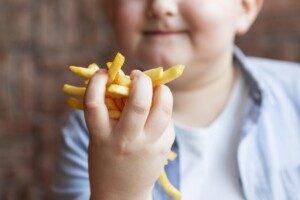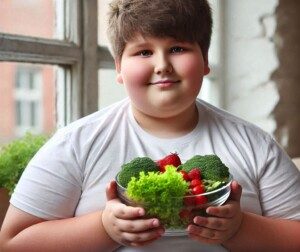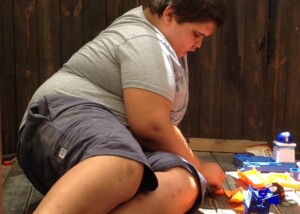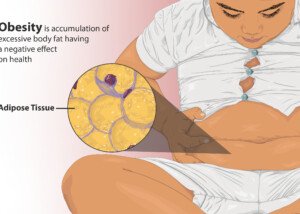
I was inspired to write this helpful article after reading an Instagram post by an obese influencer who has a chubby daughter of seven.
Her post reports that a follower had DM’d her because her preteen daughter had asked about the Keto diet.
The influencer, who openly celebrates obesity, replied that children should “never knowingly and willingly be put on, or allowed, to start a diet.”
- Does this include kids with obesity and prediabetes?
- What about children whose weight impairs their mobility or is causing obstructive sleep apnea?
Her post continues: “It breeds fear, and it perpetuates the idea that all our problems can be solved if we lose a bit of weight, which then leads to eating disorders.”
It’s also disturbing that this 295 pound (her weight’s on her TikTok) mom of two somehow comes up with the delusion that helping one’s child lose weight will teach that child that “all” problems can be solved with weight loss.
Does this include struggling with introductory algebra?
As for leading to eating disorders, many overweight kids already have an eating disorder: using excess food to cope with anxiety, stress, loneliness or boredom.
What is a diet anyways?
Everyone is on a diet, technically. What we eat is a diet. You have a diet. I have a diet. Every human has a diet.
But what about “going on” a diet?
“Going on” can mean making healthier food choices and abstaining from second helpings of pie and cake.
Nevertheless, in the English vernacular, we all know what “going on a diet” means. This begs the question: Should an overweight child go on a diet?
Yes. The issue isn’t the “going on” part. It’s what kind of diet.
Furthermore, a stitch in time saves nine: Letting “a little overweight” slide can lead to bigger weight problems down the road.
“Going on a diet” does NOT mean starving your kid or depleting them of nutrients. This myth is the creation of influencers who glorify obesity.
If a child, who’s free of a medical condition that can lead to obesity, is overweight, the parent needs to look for something that’s amiss.
Their physical activity levels need to be increased, and/or their diet – what they typically eat every day – likely is abundant in ultra-processed foods and/or has more calories than they need.
According to that “self-love” promoter, a chubby child should be allowed to eat what she or he wants.
I’m so thankful that my mother, who was strict about food intake, never allowed me this so-called food freedom. Bless her!
The influencer believes that mothers should feel at ease frequently doling out the seconds on mashed potatoes and gravy, or mac n’ cheese or cheesecake, even though the child just ate a complete meal.
How do diets breed fear?

How does a snack like this for your clinically obese child breed fear or lead to eating disorders?
I once read about a survey of grade school kids: The question to answer was, “What scares you the most.”
The two top answers were: 1) Being called to the principal’s office, and 2) Parents getting divorced.
Going on a diet certainly didn’t make the list.
Just what are kids fearful of, anyways? Spiders, thunder, a teacher’s stern look, the failure of living up to their parents’ expectations, a bully at school, Dad getting into a plane crash on his next business trip, Grandma’s declining health, a sports injury, even the very rare school shooting. But DIETS? Come on!
Diets don’t breed fear; parents do. It’s all in how the parents handle it.
If your mother harshly punished you for not “sticking to your diet” or for not losing an expected amount of weight, then the problem wasn’t the concept of eating healthfully for weight loss. It was your mother.
According to many fat acceptance influencers, you should let your overweight child eat lots of fast-food every day if they want.
Diets in Children Leading to Eating Disorders

Freepik.com
If a woman tells her chubby child, “I’m going to put you on a diet,” does this really put the girl at risk for developing anorexia nervosa or bulimia nervosa?
First off, any new eating plan for a child should:
- Allow them to still eat their favorite processed foods – but in controlled amounts and frequency.
- Emphasize portion control.
- Discourage food intake for reasons other than hunger, such as watching TV, playing video games, boredom, being rewarded or to quiet the child (e.g., giving a noisy child in the backseat of your car a candy bar to quiet her).
- Restrict processed sugary foods (as adults should also, whether they want to lose weight or not).
- Increase produce intake.
Since I’m not an eating disorders doctor, I’m not going to make statements about the causes of eating disorders. Instead, I’m going to ask questions.
#1. Have you ever read in a psychiatry journal what causes eating disorders?
#2. If so, did any of the causes include putting overweight kids on healthful, reasonable, sustainable diets in the absence of punishments or body shaming?
#3. Did any of the causes pertain to family dynamics such as whether or not the parents made their child feel validated?
#4. Did you notice that anorexia nervosa was strongly associated with perfectionistic parents who demanded high achievement from their kids – that an A- on a book report wasn’t good enough; it had to be an A+?
That second place in anything (science fair, sports event) wasn’t good enough, and not placing at all meant getting berated by a parent?
#5. Did you notice that past childhood sexual abuse is disproportionately present in those with bulimia nervosa?
#6. Did you read that the cause of eating disorders is “multi-factorial”?
What the fat activism influencer is essentially saying is that it’s wrong to limit the amount of junk food your kid eats.
She and other fat acceptance campaigners also believe it’s wrong and potentially fear-inducing to provide more fruits and nuts for snacks, and less ice cream, cookies and cheese puffs.
What would she think about a parent who decides to serve water with her kids’ summertime lunch rather than soda or a sugary fruit drink?
Think of a New Diet As a Healthier Way to Eat

An overweight child whose parents have decided to bring more healthful food into the house and less processed fare is a child who will be healthier, more energetic, faster, better at sports, less likely to get sick — and less likely to develop unhealthy levels of body fat if they’re not overweight.
This isn’t about fear. It’s about health and the prevention or mitigation of obesity.
Do not let Instagram and TikTok preachers of fat liberation guilt you into thinking that a good parent lets their kids eat whatever and how much they want, and that a mean parent is one who gives their hungry child an apple or banana as a snack instead of an ice cream bar.
Obesity Is Dangerous to Kids Including Their Brain Development
Research shows that obese children are at a higher risk for developing chronic conditions such as type 2 diabetes, hypertension and high cholesterol.
These diseases are becoming more common in kids due to rising obesity rates (American Heart Association, 2020).
Furthermore, obese children are more likely to develop painful joint problems, including early-onset osteoarthritis, because excess weight places stress on their bones and joints (Gupta et al., 2021).
Being very overweight as a child significantly increases the risk of obesity in adulthood, which is associated with a higher likelihood of developing cardiovascular diseases, kidney disease, stroke, certain cancers, miscarriage, infertility and blood clots (World Health Organization, 2023).
FACTS are FACTS. No medical degree required.
 Lorra Garrick is a former personal trainer certified through the American Council on Exercise. At Bally Total Fitness she trained women and men of all ages for fat loss, increased strength, muscle building, fitness and improved cardiovascular and overall health.
Lorra Garrick is a former personal trainer certified through the American Council on Exercise. At Bally Total Fitness she trained women and men of all ages for fat loss, increased strength, muscle building, fitness and improved cardiovascular and overall health.
.









































